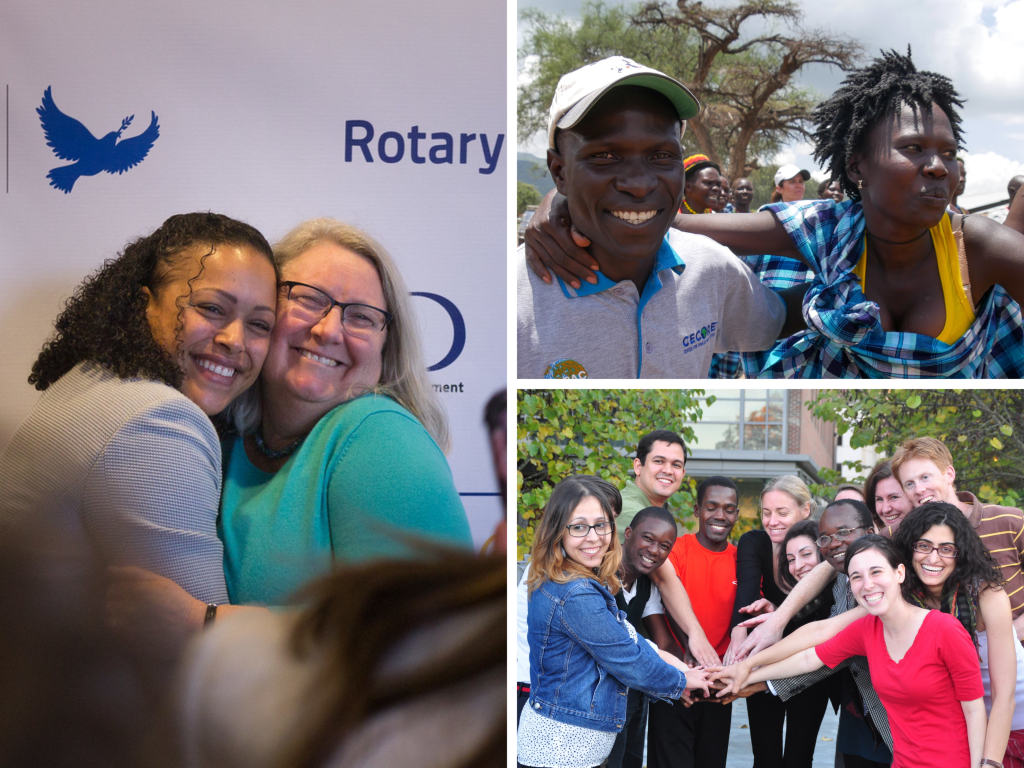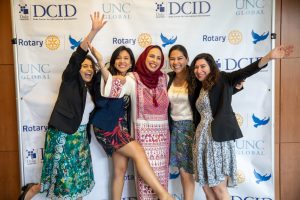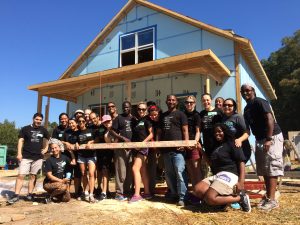Duke-UNC Rotary Peace Center Celebrates 20th Anniversary
March 7, 2023UNC Global Affairs
 Left: Daniela Schermerhorn, Class 15 Rotary Peace Fellow (left), hugs Catherine Admay, the Center’s Faculty Director at Duke University (right), at the Rotary Peace Center’s 2018 spring conference.
Top right: Patrick Bwire, Class 15 Rotary Peace Fellow, conducts a community peace sensitization exercise in the Karamoja region of northeastern Uganda with CECORE.
Bottom right: Class 11 Rotary Peace Fellows at the FedEx Global Education Center.
Left: Daniela Schermerhorn, Class 15 Rotary Peace Fellow (left), hugs Catherine Admay, the Center’s Faculty Director at Duke University (right), at the Rotary Peace Center’s 2018 spring conference.
Top right: Patrick Bwire, Class 15 Rotary Peace Fellow, conducts a community peace sensitization exercise in the Karamoja region of northeastern Uganda with CECORE.
Bottom right: Class 11 Rotary Peace Fellows at the FedEx Global Education Center.
Nearly 20 years ago, the Duke-UNC Rotary Peace Center, jointly hosted by Duke University and UNC-Chapel Hill, began selecting and training fellows from around the world to become skilled peacebuilders. One of seven Rotary Peace Center partner universities worldwide, the Center has produced 168 alumni from 64 countries to date.
Each year, the two universities welcome 10 new fellows—five on each campus—for two years of graduate study in programs related to peacemaking, international development, public health, global studies and related fields. Rotary International funds the fellowships, which cover tuition and living expenses.
The Center will celebrate its anniversary on April 1 at the annual Rotary Peace Center Conference, in which graduating fellows present their research on a wide range of issues affecting peace around the world. This year, fellows will focus on the theme “New Paradigms of Peace, Development and Sustainability,” and the conference will spotlight the impact the fellowship has had on the careers of former fellows.
Susan Carroll, managing director of the Center, has witnessed the Center evolve since she joined in 2005.
“Fifteen years ago, we didn’t get a lot of applications and used to say this was the best opportunity that no one had ever heard of,” Carroll said with a laugh. Today, the Center’s application cycles have become highly competitive. In 2022, the Center received nearly 250 applications for just 11 fellowship spots, more than any other Rotary Peace Center.

Carroll noted that the Center’s applicant pool has diversified as well. Most international students at UNC-Chapel Hill come from China and India, but in recent years Carolina’s Rotary fellows have come from Afghanistan, Chile, Myanmar, Democratic Republic of Congo and other less represented countries.
“Our Rotary Center is fortunate to receive applications from candidates from all over the world,” said Carroll. “As a program in which peacebuilding and conflict transformation are our core mandates, we feel it is more important than ever to consider an applicant’s home country and recognize the relevant experience students bring from countries that are considered fragile states, in the middle of conflict or coming out of a recent conflict.”
Moh Eid, an alumnus from Gaza, Palestine, now serves as a program officer in the Peace Center Program at Rotary International.
“Growing up in a region plagued by conflict, I had become accustomed to the pervasive and often debilitating effects of conflict on individuals and communities,” said Eid. Through Rotary, he learned how to analyze conflict and develop effective strategies for intervention. Eid said that it also taught him how to approach conflicts with more empathy and understanding.
“The world isn’t going to break out in peace anytime soon, but the Rotary Peace fellow alumni, which now number nearly 1,700 from all centers, are working hard to chip away at these global challenges,” said Carroll.
Forty-one percent of Duke-UNC Rotary Peace Center alumni work in NGOs, 15 percent in government agencies and 10 percent in United Nations agencies. Others have gone on to pursue advanced degrees, teach or practice law. Their careers range from a variety of fields including refugee mental health, water sanitation and diplomacy.
Just as Rotary fellows impact communities around the world, they also impact the Carolina community.
UNC-Chapel Hill students engage with Rotary fellows as classmates, and some Rotary alumni are now instructing Carolina courses. Zumrat Salmorbekova, an alumna from Kyrgyzstan, has taught GLBL 710: Monitoring and Evaluation for Peacebuilding Interventions since 2019.
“As an alumna of the Rotary Peace Fellowship class 6 at the Duke-UNC Rotary Peace Center, I feel enthusiastic to be coming full circle and sharing my practical experience with current Rotary Peace fellows and global studies students,” said Salmorbekova.

Through local Rotary clubs, fellows also participate in community service in Chapel Hill and surrounding areas with organizations like Stop Hunger Now and Habitat for Humanity.
Barbara Stephenson, vice provost for global affairs, believes that the Duke-UNC Rotary Peace Center infuses UNC-Chapel Hill with a global mindset.
“Rotary fellows bring an array of perspectives and ideas from around the world to our community,” said Stephenson. “In addition to preparing the fellows for peacebuilding, the Center brings the world to Carolina and helps us prepare all students to become tomorrow’s leaders addressing the world’s greatest challenges.”
Alumnus Kiran Singh Sirah, originally from the U.K. and now the president of the International Storytelling Center in Tennessee, echoed Stephenson’s sentiment.
“The fellowship opened a door to envisioning a world full of possibilities, and I use what I now know to empower others as we all work together in making the world a better place,” said Sirah. “I think all of us Peace fellows came to the fellowship with different ideas and experiences, but one thing we have in common is we all believe that a better world is possible.”
All photos courtesy of the Duke-UNC Rotary Peace Center.
